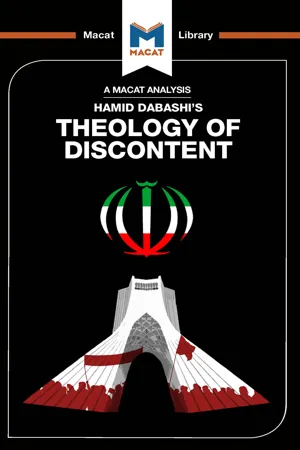
An Analysis of Hamid Dabashi's Theology of Discontent
The Ideological Foundation of the Islamic Revolution in Iran
- 100 pages
- English
- ePUB (mobile friendly)
- Available on iOS & Android
An Analysis of Hamid Dabashi's Theology of Discontent
The Ideological Foundation of the Islamic Revolution in Iran
About this book
Hamid Dabashi's 1997 work Theology of Discontent reveals a creative thinker capable not only of understanding how an argument is built, but also of redefining old issues in new ways. The Iranian Revolution of 1978–9 was front-page news in the West, and in some ways remains so today. Though it was an uprising against authoritarian royal rule, with a coalition of modernisers and Islamists, the revolution saw the birth of a new Islamic Republic that seemed to reject pro-Western democracy. Dabashi wanted to analyze the real reasons for this change, while examining how Islamic ideologies contributed to the revolution and the republic that followed.
Theology of Discontent examines different Islamic thinkers, analyzing how views with seemingly little in common contributed to the modern Iranian belief system. Beyond its insightful analytical dissection of these eight thinkers, Theology of Discontent also shows Dabashi's creative thinking skills. Reframing the debates about Iran's relationship with the West, he traced the ways in which Iranian identity formed in reactive opposition to Western ideas. In many ways, Dabashi suggested, Iran was trapped in a cycle of deliberately asserting its difference from the West, a process that was fundamental to the development of its own unique brand of revolutionary Islamism.
Frequently asked questions
- Essential is ideal for learners and professionals who enjoy exploring a wide range of subjects. Access the Essential Library with 800,000+ trusted titles and best-sellers across business, personal growth, and the humanities. Includes unlimited reading time and Standard Read Aloud voice.
- Complete: Perfect for advanced learners and researchers needing full, unrestricted access. Unlock 1.4M+ books across hundreds of subjects, including academic and specialized titles. The Complete Plan also includes advanced features like Premium Read Aloud and Research Assistant.
Please note we cannot support devices running on iOS 13 and Android 7 or earlier. Learn more about using the app.
Information
Table of contents
- Cover Page
- Title Page
- Copyright
- Contents
- WAYS IN TO THE TEXT
- SECTION 1: INFLUENCES
- SECTION 2: IDEAS
- SECTION 3: IMPACT
- Glossary of Terms
- People Mentioned In The Text
- Works Cited